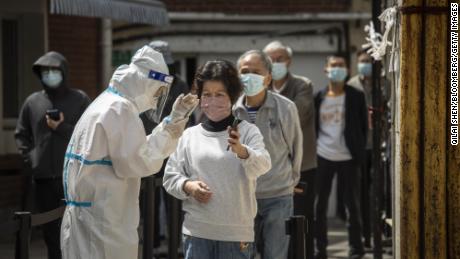Flying into Beijing is tougher than ever as China ramps up its zero-Covid measures

Flights from Tokyo to Beijing this week were impossible to find — the closest available flight was to Kunming, southern Yunnan province, around 1,600 miles (2,600 kilometers) away. There, I’ll spend 21 days in quarantine, and even then, there’s no guarantee I’ll be allowed into the Chinese capital.China’s strategy of strict border controls, snap lockdowns, and mass testing worked in the early days of the pandemic to contain the spread of Covid-19, but theSince mid-December, China’s average daily case count has surged from double-digits to more than 20,000. At least 27 cities across the country are under full or partial lockdown, impacting around 180 million people, according to CNN’s calculations. Some of the strictest measures are in force in the country’s financial powerhouse, Shanghai, where many of its 25 million residents have been sealed inside their residential compounds for more than a month, creating discontent that has flooded China’s heavily policed internet.Government censors have been racing to keep up with aForeigners can only enter under very limited circumstances, and it’s exceptionally difficult for American journalists to get a China visas due to deteriorating US-China relations. Both countries agreed to relax visa restrictions for the others’ journalists after a meeting between US President Joe Biden and Chinese leader Xi Jinping last November. I was granted a visa earlier this year after several rounds of interviews.But still, when I handed over my American passport, the immigration officer spent several minutes flipping through the pages, then called over a group of workers with “police” written on their hazmat suits. It seemed I was the only one from the flight pulled aside.They took me to a private room for questioning, and after a lengthy police interrogation about my professional and personal life, I was allowed to continue through immigration and customs. After clearing immigration, I struck up a conversation with the man standing beside me as we waited to board the bus to the quarantine hotel. He’s from Shanghai, but had been living in Japan for the past 30 years. He hadn’t been back to China since the pandemic started, but eventually decided the 21-day quarantine to enter the country was worth it to visit his elderly mother in Shanghai. The city is now under a weekslong Covid lockdown, so his only option was to fly to Yunnan and wait until the situation improved. China’s National Health Commission said Friday the “zero Covid-19 policy” had shown initial results in Shanghai, and the situation across the country is showing a downward trend.Even before this latest outbreak, arrivals from parts of China deemed “high risk” were required to spend another 14 days in government quarantine in Beijing. Fortunately, Yunnan isn’t one of them at the moment. Incoming domestic travelers from lower risk destinations have to spend at least seven days sealed in their homes for health monitoring. China’s authorities have doubled down on the zero-Covid policy, reasoning that it has allowed the country to avoid the explosion of deaths in other parts of the world and will buy time to vaccinate vulnerable groups like the elderly and children.”If we lose the Covid control measures, a large number of people will be infected with many critical patients and deaths, causing the overwhelming of (the) medical system,” National Health Commission Vice Director Li Bin said Friday. But critics say the policy is more about politics than science. President Xi has put his personal stamp on “zero-Covid,” and officials have frequently used the low death rate to argue that China’s system is superior to the West, where restrictions have eased to reflect rising vaccination rates. But in China, there’s no sign of change, and people are growing fatigued.In year three of the pandemic, China still refuses to live with Covid. No case is tolerated, no matter the cost.




